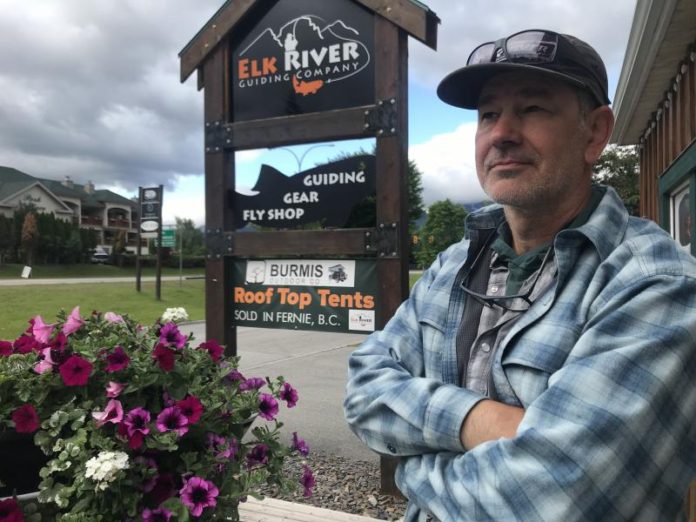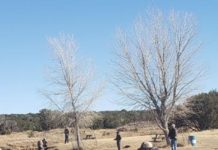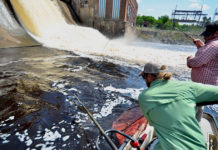This story is part of a collaboration between the Mountain West News Bureau and the Canadian Broadcasting Corporation. Read about how a U.S. border town is responding to the shutdown here.
Paul Samycia started his fly fishing company two decades ago and has grown it into the largest in Fernie, British Columbia. But these days, Samycia’s Elk River Guiding Company is adrift.
Traditionally more than two-thirds of the company’s clients are Americans, and with the border closed, Samycia says the season is almost a write-off.
“By the end of July we normally have about 220 trips under our belt, and this year we are going to be lucky if we break 50,” he says.
Fernie is only 45 minutes from Montana and the U.S. border, and a big part of the town’s tourist traffic crosses that border to fish, hike, bike, ski, or poke around the historic mining town in the Rocky Mountains.
At the visitors center off the main highway, Tourism Fernie Executive Officer Jikke Gyorki says visitation is down between 10 and 20 percent, which roughly corresponds to American visitation in a normal year.
With the border closed, Gyorki says, Tourism Fernie has shifted marketing to Eastern Canada while encouraging B.C. residents to consider a “staycation,” but she says it is hard to replace American visitors who tend to spend a lot of money.
“We’ll see a U.S. visitor spend up to $600 per day, easily, per person,” she says, “whereas a regional drive traveler will probably spend $150 to $200 dollars a day.”
When the coronavirus hit here in the spring all but essential businesses closed up and stayed closed. Now British Columbia is in phase three of its reopening plan.
Residents of the province are not discouraged from traveling within B.C. anymore and people from neighbouring Alberta are beginning to return as well. The town is getting its vibrancy back, but parts of the tourism industry that capitalize on fly fishing and hunting are expecting a terrible season.
And with no opening date in sight for the U.S.- Canada border, Fernie’s ski industry will be hit next.
“The border not opening is of course a huge question for certain businesses in this community and is going to be a much bigger question even as winter comes,” says Gordon Sombrowski who owns two hotels in Fernie and a third is Spokane, Washington. “Much of what we have experienced revolves around the anxiety of the unknown.”
Sombrowski says he has no option but to plan for the worst case scenario – a closed border for up to two years – which he says will be devastating for the community’s tourism-based economy.
Still, the mayor here, Ange Qualizza, says even business owners don’t want the border reopened until the United States has the pandemic under control.
“They don’t want to put Canada or Fernie in harm’s way,” Qualizza says. “They’d love to see their business model return. However, not at the expense of safety.”
This story was produced by the Mountain West News Bureau, a collaboration between Wyoming Public Media, Boise State Public Radio in Idaho, KUER in Salt Lake City, KUNR in Nevada, the O’Connor Center for the Rocky Mountain West in Montana, KUNC in Colorado and KUNM in New Mexico. Funding for the Mountain West News Bureau is provided in part by the Corporation for Public Broadcasting.
Credit: Source link






























